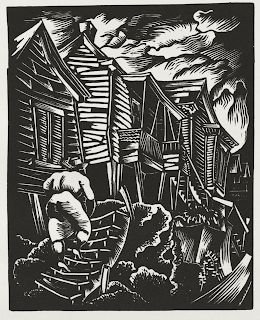Hale Aspacio Woodruff (USA, 1900-1980) was a painter whose most famous work is the set of Amistad Mutiny Murals at Talladega College library. I, however, am here for his relief prints. These are linoleum block prints, and most of them come from a series done while Woodruff was teaching at Atlanta University from 1931-1946.
Woodruff mostly made images of people and buildings, and his pieces in the Atlanta series evoke ordinary working-class people in shabby houses, built for basics rather than fanciness. Woodruff’s gouges, with no perfectly straight lines, give roofs a look of
sagging and wood siding a look of warping. The second piece takes it to an extreme, showing a barn that looks like a puff of wind would collapse the whole thing. The puff of wind might also knock over the poor broken-backed, rib-showing mule. While I fully acknowledge that no one actually wants this for their own house, I do like the way it looks in these block prints! And I like the way Woodruff lets his strokes build these plank-sided shacks.
I do like the buildings best, but I’ve included a couple of people as well. First the head of an old woman, which is not part of the same Atlanta series. In this one you can clearly see the influence of the carved geometry of African masks. Woodruff spent several years in Paris where he was infected by the same bug for African art that was biting so many of the avant garde artists there. And the fourth piece shows a woman coming home, presumably after a day’s work. The hat looks like field work to me,
but those shoes most definitely do not! Again, though, I can’t help being more drawn to the buildings than the woman. And again, although I’m sure these houses are far from the most luxurious accommodations, I just love the crooked edges and angles, the precarious porches, and the patterns of boards. I will point out that the third house in the row actually does have some fancy touches in its architecture.
A note on titles: many of these pieces seem to have multiple different titles according to different places on the web. The fourth piece, for example, is variously called “Coming Home,” “Returning Home,” “Shantytown,” “Going Home,” and “View of Atlanta.” I don’t know whether this means that Woodruff didn’t actually title them himself, or whether it means that he himself called them different things at different times.
In addition to making art of his own, Woodruff taught in several different programs and also did a lot of work to support and promote African-American artists and their work. If you want to see more of Woodruff’s people, you can look him up. He’s depicted people coming from church, a guitarist, even a rather abstract girl jumping rope, among others. There are also a couple of images of lynchings in the Atlanta series, which horrifically were also part of the experience of the people of Atlanta. But I can’t help thinking that on the whole Woodruff was celebrating the communities that lived and worked and worshipped in these buildings, and he gave them a real beauty.
I finish with two pieces from a series depicting the campus of Spelman College, where Woodruff also taught art classes. These buildings are stately and beautiful. No warping boards here, but I love the way Woodruff portrays them just as much. The shadows, the textures, and the way you can see simple gouges becoming complex elements of the image are all extremely satisfying to me.
[Pictures: Old Church, linoleum cut by Hale Woodruff, c.1935 (Image from Cleveland Museum of Art);
Relics, linoleum cut by Hale Woodruff, c.1935 (Image from Cleveland Museum of Art);
Head of Old Woman, linoleum cut, c. 1930s (Image from Mutual Art);
Coming Home, linoleum cut by Woodruff, c.1935 (Image from Cleveland Museum of Art);
Oglethorpe, linocut by Woodruff, 1935 (Image from Spelman College);
Giles Hall, linocut by Woodruff, 1935 (Image from Spelman College).]






No comments:
Post a Comment